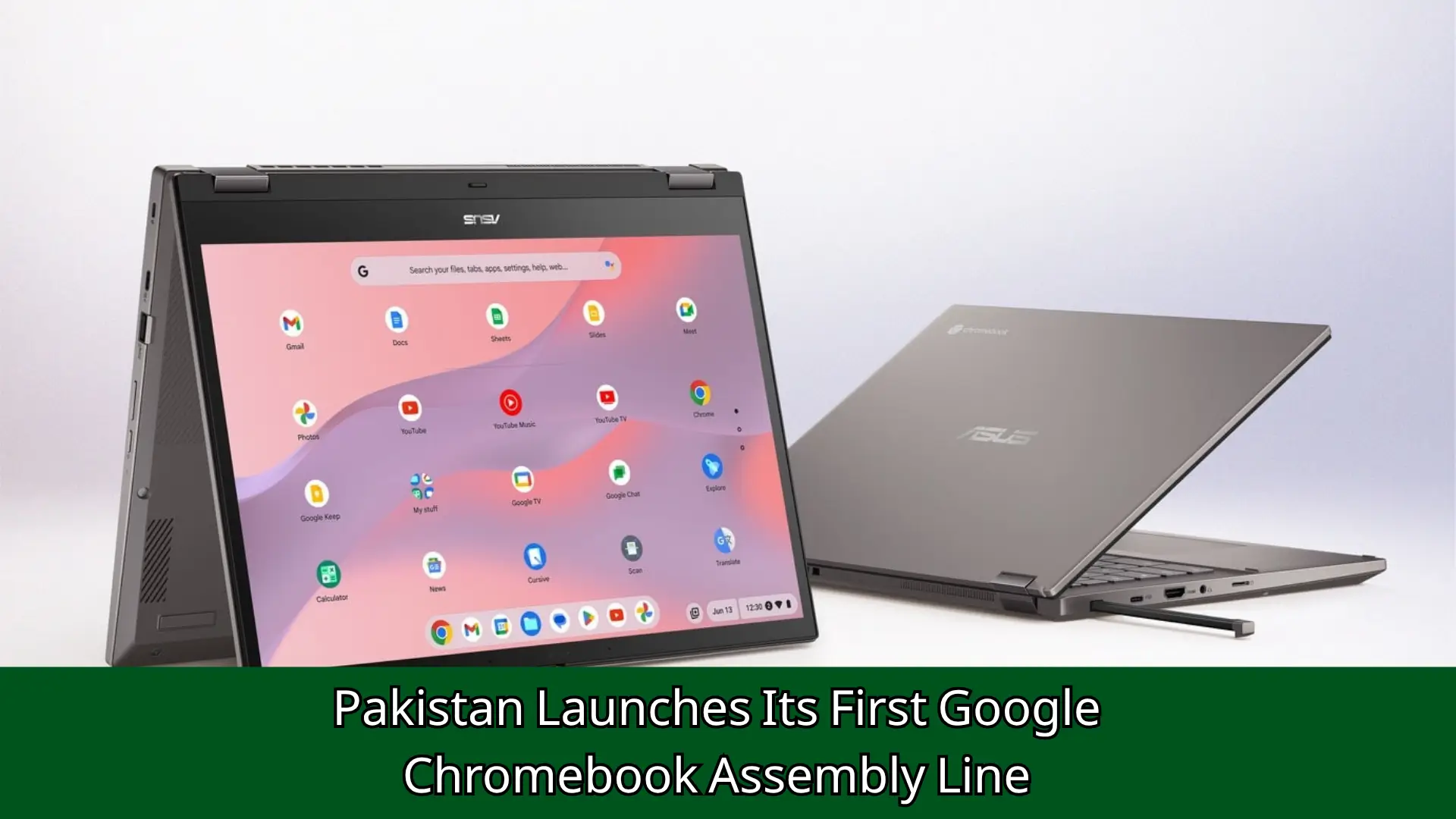Pakistan Launches Its First Google Chromebook Assembly Line. Pakistan has taken a major step toward digital transformation with the launch of its first Google Chromebook assembly line. Though officials describe it as a “launch,” the move primarily marks the announcement of plans for local Chromebook production — a milestone that promises affordable technology, skill development, and new employment opportunities across the country.
A Milestone for Pakistan’s Tech Industry
The announcement came from a high-profile ceremony in Islamabad, where Deputy Prime Minister and Foreign Minister Ishaq Dar called it a “momentous occasion” for Pakistan’s growing technology ecosystem.
The Google Chromebook assembly line will be established at the National Radio & Telecommunications Corporation (NRTC) facility in Haripur. Once operational, it is expected to produce up to 500,000 Chromebooks annually by 2026 — specifically tailored to meet the needs of students, educators, and public sector professionals.
Dar emphasized that this step aligns with Pakistan’s Digital Nation Vision and the National Artificial Intelligence (AI) Policy, both of which aim to strengthen the country’s digital infrastructure and expand technology access nationwide.
Why Google Chromebooks Matter for Pakistan
Chromebooks — known for their speed, simplicity, and affordability — have gained immense popularity in global education systems. Bringing their assembly to Pakistan offers several key benefits:
| Benefit | Description |
|---|---|
| Affordable Devices | Locally assembled Chromebooks will cost less than imported models, making them more accessible to students and professionals. |
| Job Creation | The new assembly line will create direct and indirect employment opportunities in manufacturing and supply chains. |
| Technology Transfer | Collaboration with Google encourages skill development and knowledge sharing with local engineers and developers. |
| Education Empowerment | Schools and universities can integrate Chromebooks into classrooms, supporting e-learning and blended education models. |
| Export Potential | The project could eventually lead to exporting devices to nearby regions, enhancing Pakistan’s position in the tech market. |
Supporting Pakistan’s Digital Transformation Goals
The Chromebook initiative strongly supports the Prime Minister’s Digital Pakistan vision, which prioritizes affordable access to technology, internet connectivity, and digital literacy.
According to officials, local Chromebook assembly will not only reduce import dependency but also encourage industrial capacity building, supply chain expansion, and innovation in hardware manufacturing.
This aligns perfectly with Pakistan’s broader policy of encouraging foreign direct investment (FDI) in the technology sector.
Government and Google Partnership
The partnership between Pakistan’s government and Google goes beyond just hardware production.
Under a Memorandum of Understanding (MoU) signed recently, Google will train 100,000 software developers across Pakistan to enhance digital skills and empower youth for global opportunities.
Both sides also plan to advance AI-powered localized solutions, focusing on Android-based public safety systems and smart governance tools.
This reflects Google’s growing interest in Pakistan’s technology ecosystem — and the government’s openness to strategic international partnerships.
Boosting the Local Economy and Startups
Deputy Prime Minister Dar highlighted that the Google Chromebook assembly line will also stimulate entrepreneurship.
He said Google’s expanded presence will create opportunities for local startups, particularly those developing educational, productivity, and AI-driven applications. These collaborations will enable Pakistani innovators to access global platforms and attract venture investment.
Dar added that such initiatives would “lay the foundation for future technology exports” and position Pakistan as a regional technology hub.
Tax Reforms and Investment Incentives
Recognizing the importance of a stable investment climate, Dar noted that the government is working to rationalize taxes on tech products and imports.
The goal is to make Pakistan an attractive destination for global technology companies, ensuring that projects like the Chromebook assembly line can scale efficiently without being hindered by heavy taxation or regulatory barriers.
Public and Private Sector Collaboration
The NRTC’s involvement highlights Pakistan’s strategy of public-private collaboration in technology development.
By leveraging its technical expertise, NRTC aims to ensure that the Chromebooks produced in Pakistan meet global quality standards while also fulfilling the needs of local consumers.
This move is expected to encourage further collaborations between government agencies, private companies, and international tech giants.
Step Toward Self-Reliance in Tech Manufacturing
The Chromebook project is a symbol of Pakistan’s gradual shift toward local technology manufacturing.
Instead of relying solely on imports, the country is now taking steps to assemble and eventually produce components domestically, setting the stage for a sustainable tech ecosystem.
In the long term, this could inspire other global brands — such as Acer, Lenovo, or Dell — to establish assembly or production facilities within Pakistan.
Google’s Broader Commitment in Pakistan
Google has been increasing its footprint in Pakistan’s digital ecosystem. In addition to developer training, the company is:
- Offering digital marketing certifications through the Google Career Certificates Program.
- Supporting women entrepreneurs through online training programs.
- Assisting the education sector with Google Workspace for Education tools.
With the Chromebook initiative, Google’s involvement in Pakistan becomes both strategic and long-term.
Industry Reactions
Experts and industry leaders have welcomed the announcement, calling it a “game-changing step” for Pakistan’s ICT landscape.
Analysts believe that once the assembly line becomes operational, it could reduce Chromebook prices by 20–30%, making laptops more accessible to the growing youth population.
They also note that it could boost local ancillary industries, such as electronics, logistics, and after-sales services.
Conclusion
The Google Chromebook Assembly Line in Pakistan marks a pivotal step toward technological independence, youth empowerment, and digital inclusion.
While the project is still in its early stages, it reflects Pakistan’s determination to integrate technology into education and industry, while creating a fertile environment for innovation and investment.














